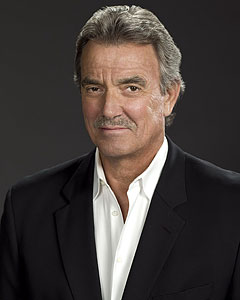Those soaps may be known for their glamour and, at times, camp, but Bill Bell cut his teeth on decidedly more realistic fare such as The Guiding Light, As The World Turns, Days of Our Lives and Another World.
But...let's get this out of the way now: this show used to be derided by industry insiders as, er, something that rhymes with "young" and The Useless. One of the requirements for any actor or actress on the show seems to be "gorgeous" (David Hasselhoff, Eva Longoria, Shemar Moore, Tom Selleck and Paul Walker are just some of the stars that got their start on Y&R)- but Emmy-worthy acting doesn't. None of that, though, has stopped The Young and The Restless from being the top-rated soap for over two decades. Why do people tune in? Because of the consistency of the writing. Bell's vision of where each story needed to go was unyielding, and he knew that a story was better when all of its aspects were played, not when it was simplified. Audiences were mesmerized by suspense and slow builds, knowing that the longer a story waited, the better the payoff was going to be.
 |
| Eric Braeden as Y&R's ruthless Victor Newman, a character you root for in spite of yourself |
If the ratings have slipped (they are still the number one show), it's due in large part to the death of Bill Bell and the constant changing of the writers' guard. However, the legacy established by Bell earned the show enough good will that the audience has faith the show will improve.
The lesson: sticking to your guns is usually a good idea.
The Bold and The Beautiful is The Young and The Restless on steroids: everyone really is beautiful, and the build can be even slower than on The Young and The Restless. However, this show is half the length of The Young and The Restless.
Shorter episodes, or shows that run on a compressed schedule, have almost universally found that they eat not less story but more, and many find themselves running at breakneck speed and verging into storylines that can quickly run out of steam. B&B, as the show is known to its fans, has bucked that trend for the most part. They put themselves on the map by focusing on the (questionable and dysfunctional) romance between Ridge Forrester, the scion of a well-to-do fashion dynasty and Brooke Logan, the ambitious and brilliant woman from "the valley" who had to fight for every advantage since her father walked out when she was a little girl. But that one story has included plenty of material, including Brooke's marriage to Ridge's father Eric (!) who had had a college romance with her mother Beth (!!), her longtime rivalry with Ridge's powerhouse mother Stephanie and Ridge's vacillation between Brooke and the cool but needy Taylor Hayes. All characters have their fans and detractors, but the commitment to the story is what kept fans coming back for more.
 |
| Brooke/Ridge/Taylor: the little love triangle that could |
The lesson: repetition can work if history is used and not ignored.

No comments:
Post a Comment